Go for what ever has the largest sensor. All mirrorless are not the same some are crop sensor some are 4/3rds.
Difference in sensor size.
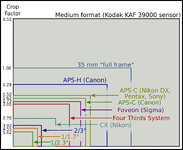
I would ignore MP you want a sensor that believe it or not has a lower density of pixels as the more pixels they cram onto a smaller sensor means more noise and worse performance. The larger the sensor the more sensitive it is to light therefore noise is greatly reduced and image quality is high.
Be warey of large mp counts on small sensor cameras. For example (as above) a Full frame sensor is the same size as a 35mm piece of film. An APS-c (or crop sensor) is roughly 1.6 or 1.6 x the size, 4/3rds again is smaller still then compact cameras are pretty much awful, down to even worce... mobiles. You wouldn't believe how small they are.
The advantage you get from using smaller sensor cameras is that A. the camera is smaller B. the lenses can be smaller C. Your focal length is multiplied by the sensor size. For example you put a 100-400mm lens on a 1.6 crop sensor camera is equivalent to 160x640mm. So can be really useful if you like wildlife, sport, motorsport etc etc The problem with smaller sensors is that wide angle lenses are harder to design and expensive, many don't have good wide angle options. A 16-35mm is almost fish eye on a full frame camera but is more like 25mm on crop so is a medium wide length. For a wide angle lens on a crop sensor 10-22mm is normal which is equivalent to a 16-35mm in full frame.
The smaller you go on the sensor size the pros and cons above are multiplied again.
The other thing to bare in mind is the Bokeh, or the nice blur you get with fast lenses. The larger the number F1.4-F2.8 etc the more subject isolation you get which is great for portraits or anything you want to focus the viewers eye on. F8-11 means everything in the scene is in focus back to front which is typical for a landscape.
The size of the sensor effects aperture too in the same way the aperture is also multiplied by the sensor crop, an F2.8 lens for example behaves like an F4 on a crop sensor, F4 is the more standard aperture for most average lenses, on a crop camera it behaves like an F6.4 lens so getting any subject isolation is hard work.
For example:
I generally shoot with full frame on a 5DMKIII but a mirrorless version would be the A7 sony series
F2.8
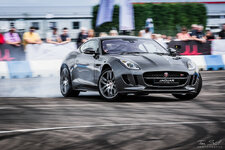 Jaguar - Art of Performance Tour
Jaguar - Art of Performance Tour by
Tom Scott, on Flickr
Notice the subject isolation and the blurred background.
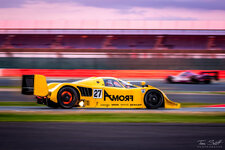 No.27 Nissan R91CK (1991) (Nova Engineering) Silverstone Classics 2016
No.27 Nissan R91CK (1991) (Nova Engineering) Silverstone Classics 2016 by
Tom Scott, on Flickr
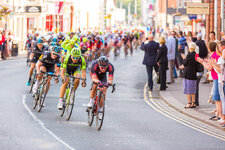 Tour of Britain 2015 coming through Penrith, Cumbria
Tour of Britain 2015 coming through Penrith, Cumbria by
Tom Scott, on Flickr
Again same thing.
Somewhere in the middle where you get a little isolation but also a good depth to the image too F4-5.6
 Paraty, Brazil
Paraty, Brazil by
Tom Scott, on Flickr
On the other side of the scale this is F11 so trying to get everything front to back in focus
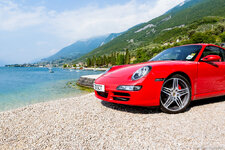 Porsche 911 Carrera S, Malcesine, Lake Garda, Italy
Porsche 911 Carrera S, Malcesine, Lake Garda, Italy by
Tom Scott, on Flickr
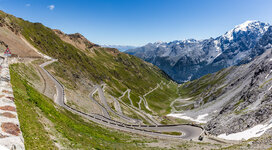 Stelvio Pass, Italy
Stelvio Pass, Italy by
Tom Scott, on Flickr
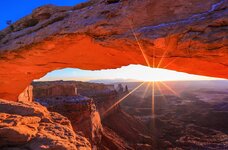 Mesa Arch, Canyonlands, Utah
Mesa Arch, Canyonlands, Utah by
Tom Scott, on Flickr
I know a lot to digest but seeing what you like and buying accordingly rather than buying then realising actually I cant achieve this with the camera I own.
IMO the best thing to do is have one of each. I use the Full frame when I need amazing subject isolation, ultimate image quality and the creamy look. I use a crop camera to get extra reach from my lenses and for speed as most crop cameras shoot 8+ frames per second. Or if I want to walk around with a slightly lighter camera.
I shoot with a Canon 7DMKII and a 5DMKIII, big heavy cameras. But I really have my eye on the new Canon M5 as its basically an 80D in a mirroless body and you get the amazing dual pixel focus in video which is the best on the market.
If I was you my choice would be either the A6000 series from sony or push the boat out a little more and get the Canon M5 as you get all the thousands of amazing lens choices from canon and other 3rd parties with an adapter that natively works and the AF isn't compromised. Whereas on all the other cameras you have to use a metabones adapter which isn't particularly brilliant.
The thing is that mirrorless is still in its infancy the 4/3rds cameras from Olympus and Fuji have a great selection of lenses but the sensor is too small IMO. So having the option of putting other lenses on the camera is a staple in the mirrorless world currently.












